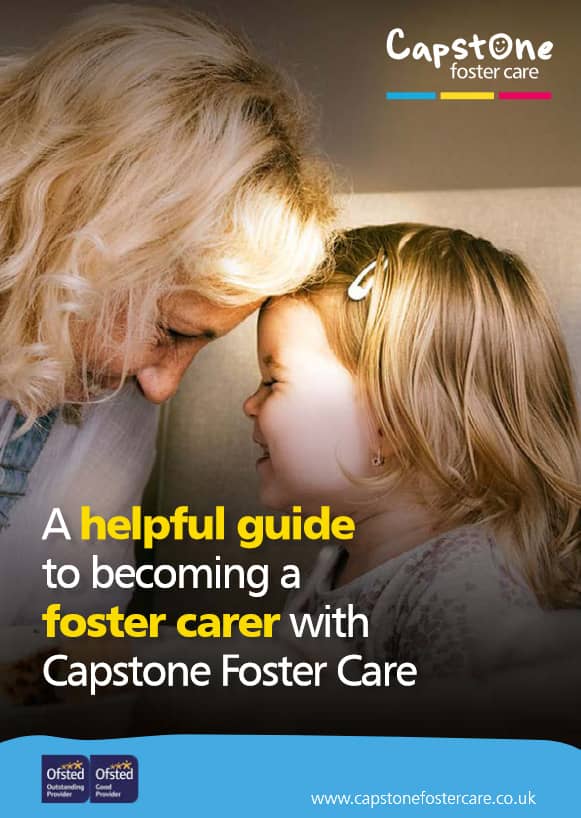


Fostering a disabled child
The role of an independent fostering agency
How to choose a foster care agency
Can I choose who I foster?
What are the benefits of fostering with an independent fostering agency?
What happens when a child is taken into care?
Fostering process: what happens on an initial home visit?
Fostering with local authority vs independent agency
A complete guide to becoming a foster carer
How Are Children in Foster Care Matched with Carers?
Foster Care Budgeting Tips
Becoming A Foster Carer
What is a Care Leaver?
What is a Foster Carer?
Fostering Regulations
How long does it take to become a Foster Carer?
What are the Foster Care requirements?
Changing IFA - Transferring to Capstone
8 reasons why a child may be taken into care
Fostering as a Career
Can you foster if you smoke or vape?
A guide to fostering assessments
LGBTQ+ Fostering
Equality, Inclusion & Anti-discriminatory Practice in Foster Care
What can disqualify you from foster care?
Can you foster if you’re on benefits?
Top transferable job skills to become a foster carer
Fostering as a same sex couple
Fostering while renting
Can you foster if you have mental health issues?
Is there an age limit for fostering in the UK?
Do foster carers get a pension?
How to foster a child: A step by step guide
How do DBS Checks Work?
Can I foster if...?
Mythbusting the top 10 Foster Care Myths
Can I foster if I am disabled?
LGBT Fostering Mythbusting
Can I foster if I have pets?
Can I Foster A Child?
Can I Foster and Work?
Can you Foster with a Criminal Record
Can Single People Foster?
LGBT Family and Foster Care
Fostering across Cultures
Muslim Fostering
Christian Foster Care
Sikh Fostering
Empty Nest Syndrome and Foster Care
Can I Foster?
What is the difference between residential care and foster care?
Fostering Babies and Young Children
What is Kinship Care?
Fostering Babies - Myths
Focusing on Parent & Child Fostering
Fostering Siblings
Fostering Teenagers
Fostering Teenagers - Breaking down the Myths
Fostering Unaccompanied and Asylum Seeking Children
Mother and Baby Foster Placements
Private Fostering
How does therapeutic fostering work?
Young Children Fostering Placements
Difference between short and long-term fostering
Types of self-harm
A Guide to the Foster Care Handbook
Reunification and Birth Parents: A Guide for Foster Carers
What is an EHC Plan? A Guide for Foster Carers
How to prepare a child for becoming a care leaver
Children who foster: impact of fostering on birth children
Fostering LGBTQ+ Youth
How to prepare your home for a foster child
How to help a lonely child: A Guide for Foster Carers
What are the National Minimum Standards for Fostering Services?
10 tips for foster children's education
How to prepare your foster child for secondary school
Tips for coping when foster placements end
Tips for foster parents during Coronavirus
What happens if foster parents get divorced?
5 ways to manage Mother's Day with foster children
Tips for managing foster children's bedtime routines
How to handle foster child bullying
Fostering allowances and the gender pay gap
What discounts can foster carers get?
How to adopt from Foster Care
5 ways to manage Father's Day for children in foster care
8 most common fostering challenges
FosterTalk Membership with Capstone Foster Care
Supporting foster children's contact with birth families
A guide to independent fostering
Keeping Children Safe Online: A Guide For Foster Carers
Movies About Foster Care
Play-based learning strategies for foster carers
A Guide to the Staying Put Program
Why Foster Parent Wellbeing Matters
How to deal with empty nest syndrome
How to recognise signs of depression in foster children
Can you take a foster child on holiday?
Tips and advice on fostering with a disability
10 tips on connecting with your Foster Child
Fostering vs Adoption - What's the difference?
How Fostering can change a future
How to adopt from Foster Care
How to encourage children to read in Foster Care
How to prepare a Foster Child's bedroom
Reading and Storytelling with Babies and Young Children
Supporting Children's Learning
The 20 most recommended books Foster Carers and young people should read
Things you can do when your children leave home
The impact of early childhood traumas on adolescence and adulthood
Anxious Disorders in Foster Children
What is sexual abuse and sexual violence
Foster Child behaviour management strategies
Foster Parent Advice: What to expect in your first year of fostering
Capstone's twelve tips at Christmas
10 celebrities who grew up in Foster Care
Could Millenials be the solution to the Foster Care crisis?
Do you work in Emergency Services?
Form F Assessor and Assessment Training
Foster Care Fortnight
Improving Children's Welfare - Celebrating Universal Children's Day
New Year - New Career - Become a Foster Carer
Young People Charities
While most of us take growing up with our siblings for granted, latest reports from the Children’s Commissioners show that 37% of children in foster care have been separated from their siblings. It’s important for siblings in care to maintain and develop their relationships with their siblings, which means there is an urgent need for foster carers who can look after sibling groups. In this guide, we’ll explain everything you need to know about fostering siblings.
When fostering a sibling group, not only will you be helping keep a family together, but you’ll also be helping them in several other ways, including:
Sometimes, it can be unavoidable to separate siblings in foster care.
The fostering requirements for siblings has the same basis as our standard fostering requirements as you must be in good health, over 21 years of ages and have enough room.
The first questions asked about prospective foster families is whether there is a separate bedroom for a foster child. It is a mandate of the fostering services that every child over the age of three has his or her own bedroom. Although, if the room is large enough, it is possible for siblings to share a bedroom if they are the same gender and under the age of 10. In some cases, this can provide comfort and security to the foster siblings who have been taken from their usual home and now find themselves in an unknown situation.
Yes, you can - providing you have enough room and your existing foster child is likely to adapt well to another addition to the family.
Our foster care matching team will work closely with the supervising social worker to take into consideration the children already in your home as well as the space you have available. If you already have siblings in your care, the same process takes place if you wish to take in another child from a separate family. The important component is to place children where they have the best chance at thriving.
Here at Capstone Foster Care, we offer expert training and support to ensure you have the tools you need to foster siblings. We’ll also provide a competitive fostering allowance to support you the needs of the fostering family. Our team of social workers and support workers are here to help build the relationship between you and your and your foster children and help them settle into their new home.
One foster carer explained the benefits of fostering siblings:
“Fostering siblings has been an amazing experience for us. We are both from large families ourselves and so realise the importance of family. We would not have it any other way now. Yes, sometimes they clash, but what siblings don’t? We just manage the situations and encourage positive relationships with each other.”
Sibling groups that are kept together experience greater stability and better mental health. It has been proven that they have better educational outcomes, which in turn leads to a more positive adulthood.
To summarise, fostering siblings can help in the following ways:
Want to know more about fostering siblings? Get in touch with a member of our expert team today.
If you’ve got any questions or would like to find out more about fostering with Capstone, fill out the form below.
An experienced fostering advisor from your local area will then be in touch.

Start the conversation today. Our team of friendly advisors are on hand to answer any foster care questions you may have. We can offer you honest and practical advice that can help you decide if becoming a foster carer is the right path for you.


